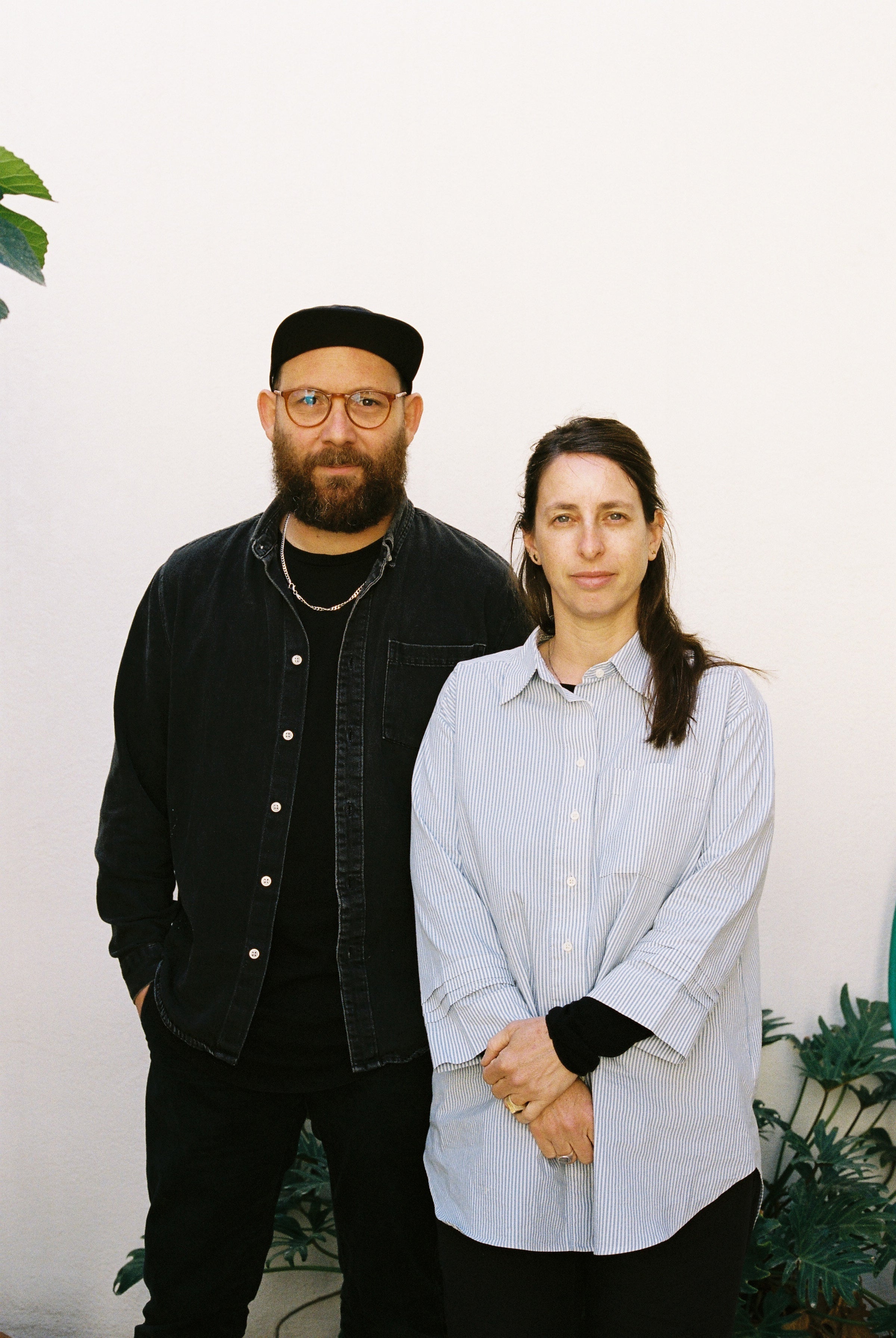Meet the Maker: A Conversation with Tomer Botner
A knife-maker who learned from YouTube and how Florentine Kitchen Knives reimagines artisan craft for a new generation
In the world of artisan knife making, where centuries-old techniques traditionally pass from master to apprentice, Tomer Botner represents something refreshingly different. The founder of Florentine Kitchen Knives didn't learn his craft in a Japanese forge or through years of formal apprenticeship. Instead, he's part of what he calls "the new breed of craftsmen" who turned to YouTube, Instagram, and sheer determination to master their trade.
For our latest collaboration, the 1-2-3 Butter box featuring a custom Florentine butter knife and three ONIMA hot sauces, we sat down with Tomer to discuss his journey from industrial design student to one of the most recognizable names in artisan kitchen knives.
Growing Up with Food in Tel Aviv
Tell us who you are and what you make.
Tomer Botner: Okay. So I was born Tel Aviv. What is that, 44 years ago? But basically the short answer is that I worked in restaurants for quite a long time and always been really into food. Comes from a family of people, just like to eat very like a classic French, like francophile. Like a French loving family. And I ended up studying industrial design and my final project was a kitchen knife that I was drawn to from these two aspects.
So mainly from the part of using it as a tool for cooking, but also the challenge of designing a tool that's existed for 2 million years and try to find something new that you can do. That was a big challenge.
How a Video Changed Everything
What was your entry point to knife-making. Is there somebody that taught you the craft? Did you do any sort of formal apprenticeships or did you have a mentor?
TB: I think I am one of the first of the kind of new breed of craftsmen who basically had YouTube as a mentor. Like, I didn't have anyone around me that could teach me and there was no history or knowledge in my country. There was nothing to draw on and even materials were hard to source. But the thing that ignited this in me was a little video I saw of a guy called Joel Bukiewicz who had a knife shop in Brooklyn.
And the video was called Made by Hand. And I ended up tattooing handmade on my hand. And it was about him and how he makes his knives. And that was a big, big inspiration of trying to make my take of it basically. And I just flew to Brooklyn, I knocked on Joel's door and we ended up hanging out for a few hours. And you know, a couple years later I had my wedding in his shop.
So Joel is definitely the guy that I was idolizing when I started this. I was lucky enough to work at his workshop a little bit and learn from him. And I've also learned a lot from other makers. And I did like, you know, one week stages here and there.
Failing Your Way to Success
TB: A lot of things is just like struggling with this. You know, you pick up, you open Instagram, you text a guy like a friend, someone you know through Instagram, and they help you out with a question.
Like you reach out to the person that you think knows this aspect of the job better and it's a very nice community and everybody helps each other out a lot. And the biggest thing with this is learn by trying. So fail, fail, fail, fail. Eventually you figure it out.

Making Business Decisions in the Workshop
Tyler: How do you decide when to respect traditional forms or innovate and push into a new direction with the design?
Tomer: I think the bigger question for me is like, once it's a business and it's no longer your hobby, there's always the balance of what you put into it against what you get out of it and the value you give to your customers. So there's a lot of things that maybe as a maker would be more interesting for me to do in a more old fashioned, classic way to achieve a result that's like a plus. But monetarily it's like a huge difference between the two.
In the end, my whole focus in what we do is value. Like give the best result for what I charge and improvement, constant improvement, make things better for the customer, but also more efficient internally and do more with less and use less materials, be more efficient in all that we consume.
And in the end, some things we would not let go for the foreseeable future. But you know, you never know. Like, we sharpen by hand and we grind the final geometries of our blade done by hand, all the blade shaping the handle shaping. But it's pretty useless to cut a shape of a blade out with a saw when you could do it with a laser machine or cut all those hundreds of thousands of discs that we cut a year any other way than with the CNCs that we use.
Like the stupid things that anyone can eventually do, we have machines do. We have people who develop skills for the things that you need a human for.
Why Florentine Knives Look Different
Have you ever faced resistance when challenging expectations of what a knife should look or feel like?
TB: Yeah, no. I think we pretty much hit a home run with this. I think we have luckily a super recognizable design. You see it, you know what it is.
The 55.6-Degree Angle and Other Small Obsessions
Have you modified or designed a tool that really suits your style?
TB: Hard to say if we designed any tools. We do a lot of little jigs to help us get things right. Like for instance, our bolsters have this angle that’s specific. It’s like 55.6 degrees. Just because we think it looks nicer. And so we CNC a little cassette to put the raw material in. And then we adjust the grinder angle according to the tool that we built. And then we just go basically a little bit left and right and we got the angle perfect.
We don’t have to do everything by eye, and more efficiently, the main things we do is use these little jigs. And sometimes we buy more machines. Usually when you become more professional, you try and get specific machines to specific jobs. Like a small wheel attachment grinder that does only this little part of the knife. And then you have one grinder for this one for that. And this one has a hard back. This one has a soft backing. This one has slack backing.
So instead of changing things, you just move between machines.
Rituals and Practices
Do you have any rituals or practices that help you get into the rhythm of making?
TB: I find it really hard to break in and out because I'm here, and usually someone needs something from me. I don't need much, I just need to be alone basically. Usually I put on a podcast or a book on my earphones and just get in the zone. It's very easy to break out of it for me, but if I'm uninterrupted, I get into it pretty easily.
What Knives Should Do
What do you hope people feel when they use one of your knives?
TB: I hope that they just can't wait to get in the kitchen and cook. I hope my knives are just a catalyst for cooking for a family, feeding someone.
Living Traditions
How do you define a living tradition in your craft? And how do you want to pass that on, whether it's to future generations of makers or whoever it may be?
TB: I definitely hope that we can. This is a hard job. It looks really sexy from the outside, but when you get to it, when you have to do it day in and day out, it's a very monotonous job. It requires a very specific mentality to do it, you need a person that wants to be perfect all the time and wants to get better in very small increments, not in leaps. You know, and it's not easy to find these days.
I think it will become harder and harder to find because everything around us is so fast and easy in a way. And who knows what the future will bring, but maybe it will be the opposite because AI would do everything for us, so we can just do our hobbies.
But I hope that we can keep these things that cannot be explained. Like many, many of the things that we do here. I really can teach to a certain level, but then comes a point where you have to make 10,000 of them to understand it. And I hope we get the chance to have people here for years and years to teach a new generation.
You know, if my kids take over, I'll be more than happy. But it's not something I'm counting on or planning for. But we are definitely mindful and try to preserve the things that we value and the tools that we make.
Once you do something and you understand the difference, once you improve something in even the slightest way, it's really hard to give it up and go back to something that's not as good. So a lot of it depends on the people you have working with you and for you. And hopefully we'll keep being lucky with the people that work with us.
About This Collaboration
Our collaboration with Florentine Kitchen Knives brings together two philosophies: Tomer's belief that knives should inspire cooking, and ONIMA's mission to make home cooking more exciting through bold, flavorful hot sauces
The 1-2-3 Butter box features a custom Florentine butter knife, showcasing a randomized pin design, paired with three of our hot sauces and a recipe zine. The butter knife itself is no longer in regular production at Florentine, making this collaboration box a unique opportunity to own a piece of their evolution as makers.
Shop the 1-2-3 Butter Box and discover how a handcrafted knife and ONIMA hot sauces can transform your everyday cooking into something worth celebrating.



